英语非谓语动词难点总结(讲义、试题和答案)
- 格式:doc
- 大小:134.00 KB
- 文档页数:23

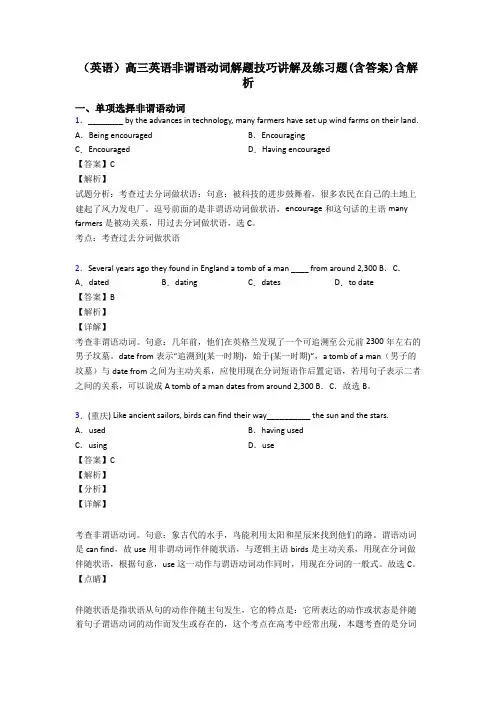
(英语)高三英语非谓语动词解题技巧讲解及练习题(含答案)含解析一、单项选择非谓语动词1.________ by the advances in technology, many farmers have set up wind farms on their land. A.Being encouraged B.EncouragingC.Encouraged D.Having encouraged【答案】C【解析】试题分析:考查过去分词做状语:句意:被科技的进步鼓舞着,很多农民在自己的土地上建起了风力发电厂。
逗号前面的是非谓语动词做状语,encourage和这句话的主语many farmers是被动关系,用过去分词做状语,选C。
考点:考查过去分词做状语2.Several years ago they found in England a tomb of a man ____ from around 2,300 B.C.A.dated B.dating C.dates D.to date【答案】B【解析】【详解】考查非谓语动词。
句意:几年前,他们在英格兰发现了一个可追溯至公元前2300年左右的男子坟墓。
date from表示“追溯到(某一时期),始于(某一时期)”,a tomb of a man(男子的坟墓)与date from之间为主动关系,应使用现在分词短语作后置定语,若用句子表示二者之间的关系,可以说成A tomb of a man dates from around 2,300 B.C.故选B。
3.(重庆) Like ancient sailors, birds can find their way__________ the sun and the stars. A.used B.having usedC.using D.use【答案】C【解析】【分析】【详解】考查非谓语动词。
句意:象古代的水手,鸟能利用太阳和星辰来找到他们的路。
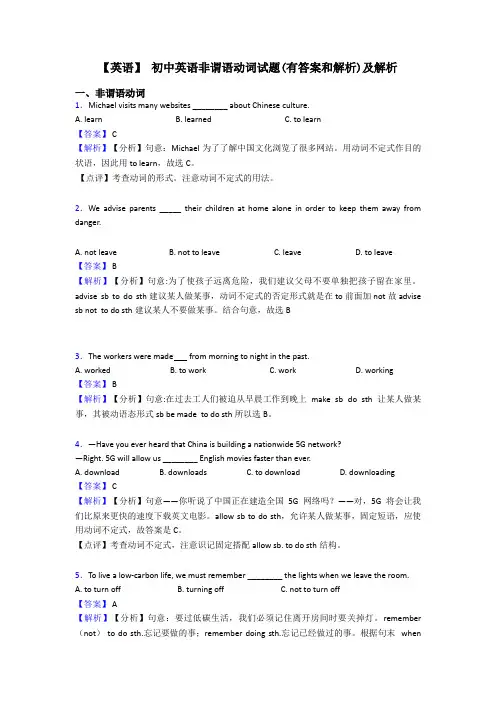
【英语】初中英语非谓语动词试题(有答案和解析)及解析一、非谓语动词1.Michael visits many websites ________ about Chinese culture.A. learnB. learnedC. to learn【答案】 C【解析】【分析】句意:Michael为了了解中国文化浏览了很多网站。
用动词不定式作目的状语,因此用to learn,故选C。
【点评】考查动词的形式。
注意动词不定式的用法。
2.We advise parents _____ their children at home alone in order to keep them away from danger.A. not leaveB. not to leaveC. leaveD. to leave【答案】 B【解析】【分析】句意:为了使孩子远离危险,我们建议父母不要单独把孩子留在家里。
advise sb to do sth建议某人做某事,动词不定式的否定形式就是在to前面加not故advise sb not to do sth建议某人不要做某事。
结合句意,故选B3.The workers were made from morning to night in the past.A. workedB. to workC. workD. working【答案】 B【解析】【分析】句意:在过去工人们被迫从早晨工作到晚上make sb do sth让某人做某事,其被动语态形式sb be made to do sth所以选B。
4.—Have you ever heard that China is building a nationwide 5G network?—Right. 5G will allow us ________ English movies faster than ever.A. downloadB. downloadsC. to downloadD. downloading【答案】 C【解析】【分析】句意——你听说了中国正在建造全国5G网络吗?——对,5G将会让我们比原来更快的速度下载英文电影。
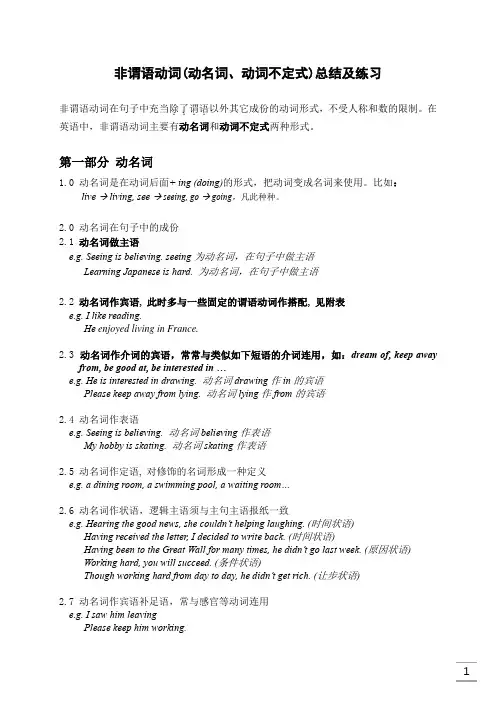
非谓语动词(动名词、动词不定式)总结及练习非谓语动词在句子中充当除了谓语....以外其它成份的动词形式,不受人称和数的限制。
在英语中,非谓语动词主要有动名词和动词不定式两种形式。
第一部分动名词1.0动名词是在动词后面+ ing (doing)的形式,把动词变成名词来使用。
比如:live → living, see → seeing, go → going,凡此种种。
2.0 动名词在句子中的成份2.1 动名词做主语e.g. Seeing is believing. seeing为动名词,在句子中做主语Learning Japanese is hard. 为动名词,在句子中做主语2.2 动名词作宾语, 此时多与一些固定的谓语动词作搭配, 见附表e.g. I like reading.He enjoyed living in France.2.3 动名词作介词的宾语,常常与类似如下短语的介词连用,如:dream of, keep awayfrom, be good at, be interested in …e.g. He is interested in drawing. 动名词drawing作in的宾语Please keep away from lying. 动名词lying作from的宾语2.4 动名词作表语e.g. Seeing is believing. 动名词believing作表语My hobby is skating. 动名词skating作表语2.5 动名词作定语, 对修饰的名词形成一种定义e.g. a dining room, a swimming pool, a waiting room…2.6 动名词作状语,逻辑主语须与主句主语报纸一致e.g. Hearing the good news, she couldn’t helping laughing. (时间状语)Having received the letter, I decided to write back. (时间状语)Having been to the Great Wall for many times, he didn’t go last week. (原因状语)Working hard, you will succeed.(条件状语)Though working hard from day to day, he didn’t get rich. (让步状语)2.7 动名词作宾语补足语,常与感官等动词连用e.g. I saw him leavingPlease keep him working.第二部分动词不定式1.0 动词不定式也是一种非谓语动词形式,其结构为“to+动词原形”,其中to不是介词而是动词不定式的符号,动词不定式没有人称和数的变化。
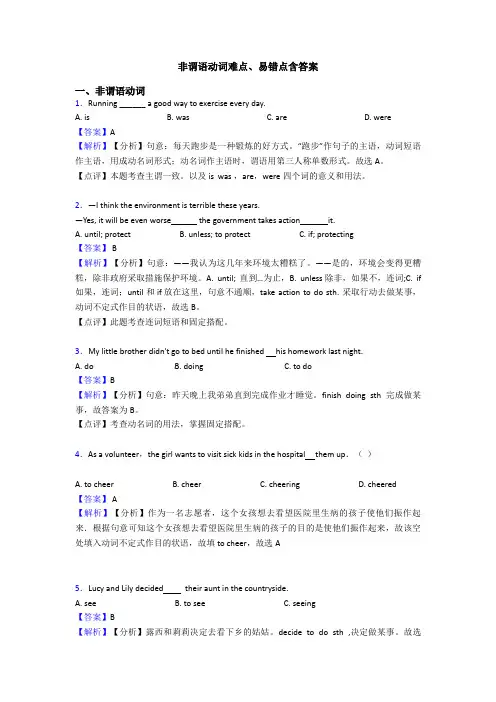
非谓语动词难点、易错点含答案一、非谓语动词1.Running ______ a good way to exercise every day.A. isB. wasC. areD. were【答案】A【解析】【分析】句意:每天跑步是一种锻炼的好方式。
“跑步”作句子的主语,动词短语作主语,用成动名词形式;动名词作主语时,谓语用第三人称单数形式。
故选A。
【点评】本题考查主谓一致。
以及is was ,are,were四个词的意义和用法。
2.—I think the environment is terrible these years.—Yes, it will be even worse the government takes action it.A. until; protectB. unless; to protectC. if; protecting【答案】 B【解析】【分析】句意:——我认为这几年来环境太糟糕了。
——是的,环境会变得更糟糕,除非政府采取措施保护环境。
A. until; 直到…为止,B. unless除非,如果不,连词;C. if 如果,连词;until和if放在这里,句意不通顺,take action to do sth. 采取行动去做某事,动词不定式作目的状语,故选B。
【点评】此题考查连词短语和固定搭配。
3.My little brother didn't go to bed until he finished his homework last night.A. doB. doingC. to do【答案】B【解析】【分析】句意:昨天晚上我弟弟直到完成作业才睡觉。
finish doing sth完成做某事,故答案为B。
【点评】考查动名词的用法,掌握固定搭配。
4.As a volunteer,the girl wants to visit sick kids in the hospital them up.()A. to cheerB. cheerC. cheeringD. cheered【答案】 A【解析】【分析】作为一名志愿者,这个女孩想去看望医院里生病的孩子使他们振作起来.根据句意可知这个女孩想去看望医院里生病的孩子的目的是使他们振作起来,故该空处填入动词不定式作目的状语,故填to cheer,故选A5.Lucy and Lily decided their aunt in the countryside.A. seeB. to seeC. seeing【答案】B【解析】【分析】露西和莉莉决定去看下乡的姑姑。
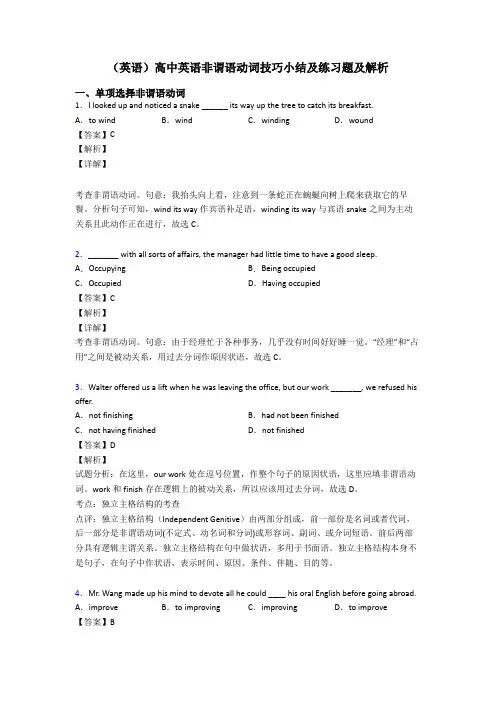
(英语)高中英语非谓语动词技巧小结及练习题及解析一、单项选择非谓语动词1.I looked up and noticed a snake ______ its way up the tree to catch its breakfast.A.to wind B.wind C.winding D.wound【答案】C【解析】【详解】考查非谓语动词。
句意:我抬头向上看,注意到一条蛇正在蜿蜒向树上爬来获取它的早餐。
分析句子可知,wind its way作宾语补足语,winding its way与宾语snake之间为主动关系且此动作正在进行,故选C。
2._______ with all sorts of affairs, the manager had little time to have a good sleep. A.Occupying B.Being occupiedC.Occupied D.Having occupied【答案】C【解析】【详解】考查非谓语动词。
句意:由于经理忙于各种事务,几乎没有时间好好睡一觉。
“经理”和“占用”之间是被动关系,用过去分词作原因状语,故选C。
3.Walter offered us a lift when he was leaving the office, but our work _______, we refused his offer.A.not finishing B.had not been finishedC.not having finished D.not finished【答案】D【解析】试题分析:在这里,our work处在逗号位置,作整个句子的原因状语,这里应填非谓语动词。
work和finish存在逻辑上的被动关系,所以应该用过去分词,故选D。
考点:独立主格结构的考查点评:独立主格结构(Independent Genitive)由两部分组成,前一部份是名词或者代词,后一部分是非谓语动词(不定式、动名词和分词)或形容词、副词、或介词短语。
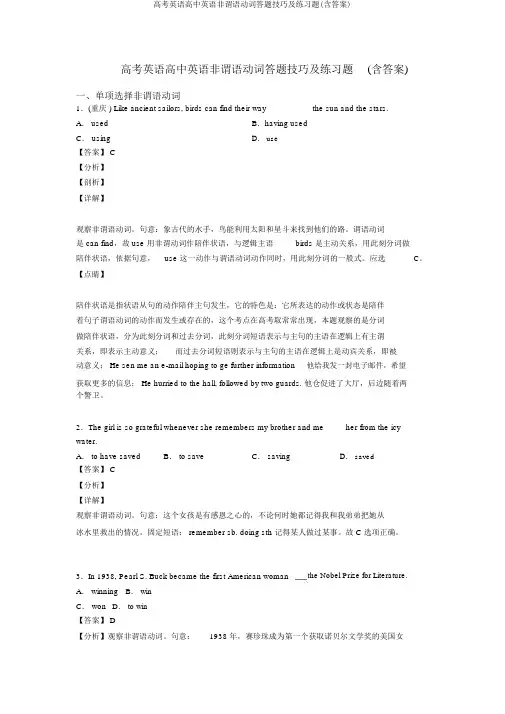
高考英语高中英语非谓语动词答题技巧及练习题(含答案)一、单项选择非谓语动词1.(重庆 ) Like ancient sailors, birds can find their way__________ the sun and the stars.A. used B.having usedC. using D. use【答案】 C【分析】【剖析】【详解】观察非谓语动词。
句意:象古代的水手,鸟能利用太阳和星斗来找到他们的路。
谓语动词是 can find,故 use 用非谓动词作陪伴状语,与逻辑主语birds 是主动关系,用此刻分词做陪伴状语,依据句意,use 这一动作与谓语动词动作同时,用此刻分词的一般式。
应选C。
【点睛】陪伴状语是指状语从句的动作陪伴主句发生,它的特色是:它所表达的动作或状态是陪伴着句子谓语动词的动作而发生或存在的,这个考点在高考取常常出现,本题观察的是分词做陪伴状语,分为此刻分词和过去分词,此刻分词短语表示与主句的主语在逻辑上有主谓关系,即表示主动意义;而过去分词短语则表示与主句的主语在逻辑上是动宾关系,即被动意义; He sen me an e-mail hoping to ge further information他给我发一封电子邮件,希望获取更多的信息; He hurried to the hall, followed by two guards. 他仓促进了大厅,后边随着两个警卫。
2.The girl is so grateful whenever she remembers my brother and me ____ her from the icy water.A. to have saved B. to save C. saving D. saved【答案】 C【分析】【详解】观察非谓语动词。
句意:这个女孩是有感恩之心的,不论何时她都记得我和我弟弟把她从冰水里救出的情况。
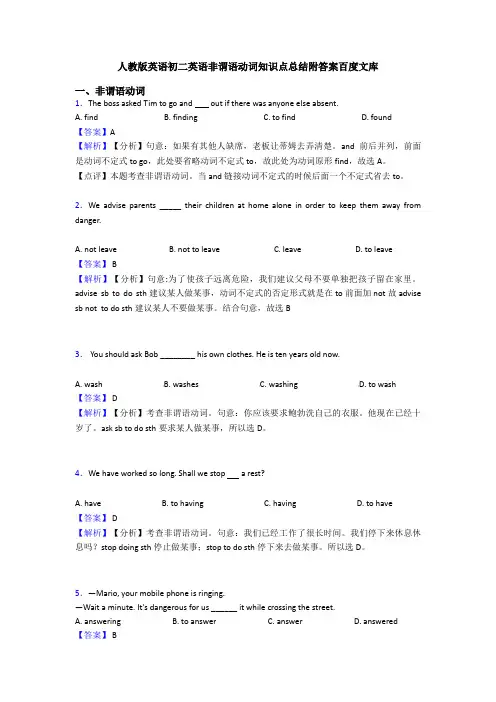
人教版英语初二英语非谓语动词知识点总结附答案百度文库一、非谓语动词1.The boss asked Tim to go and out if there was anyone else absent.A. findB. findingC. to findD. found【答案】A【解析】【分析】句意:如果有其他人缺席,老板让蒂姆去弄清楚。
and前后并列,前面是动词不定式to go,此处要省略动词不定式to,故此处为动词原形find,故选A。
【点评】本题考查非谓语动词。
当and链接动词不定式的时候后面一个不定式省去to。
2.We advise parents _____ their children at home alone in order to keep them away from danger.A. not leaveB. not to leaveC. leaveD. to leave【答案】 B【解析】【分析】句意:为了使孩子远离危险,我们建议父母不要单独把孩子留在家里。
advise sb to do sth建议某人做某事,动词不定式的否定形式就是在to前面加not故advise sb not to do sth建议某人不要做某事。
结合句意,故选B3. You should ask Bob ________ his own clothes. He is ten years old now.A. washB. washesC. washingD. to wash【答案】 D【解析】【分析】考查非谓语动词。
句意:你应该要求鲍勃洗自己的衣服。
他现在已经十岁了。
ask sb to do sth要求某人做某事,所以选D。
4.We have worked so long. Shall we stop a rest?A. haveB. to havingC. havingD. to have【答案】 D【解析】【分析】考查非谓语动词。
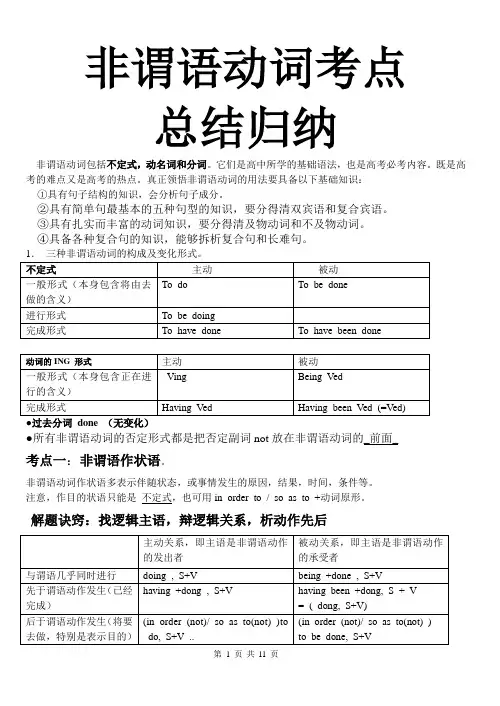
非谓语动词考点总结归纳非谓语动词包括不定式,动名词和分词。
它们是高中所学的基础语法,也是高考必考内容。
既是高考的难点又是高考的热点。
真正领悟非谓语动词的用法要具备以下基础知识:①具有句子结构的知识,会分析句子成分。
②具有简单句最基本的五种句型的知识,要分得清双宾语和复合宾语。
③具有扎实而丰富的动词知识,要分得清及物动词和不及物动词。
④具备各种复合句的知识,能够拆析复合句和长难句。
●所有非谓语动词的否定形式都是把否定副词not放在非谓语动词的_前面_考点一:非谓语作状语。
非谓语动词作状语多表示伴随状态,或事情发生的原因,结果,时间,条件等。
注意,作目的状语只能是_不定式,也可用in order to / so as to +动词原形。
解题诀窍:找逻辑主语,辩逻辑关系,析动作先后●不定式做结果状语的固定搭配only to do ,too +adj/adv to do,so +adj/adv as to do ,such +n as to do adj/ adv enough to doonly to do 常表示意想不到或不愉快的结果。
练习:1. _____that it was going to snow, the climbers decided to put off their attempt on the highest mountain.A. Having toldB. Having been toldC. TellD. Telling2 . _____ time and labor, cartoonists generally draw the hands of their characters with only3 fingers and a thumb.A. To saveB. SavedC. SavingD. Having saved3 Hoping he would not be seen, Bob stole in, _____ his schoolbag and rushed out.A. picking upB. picked upC. to pick upD. having picked up4 _____ the distance was too long and the time was short, we decided not to drive to Florida.A. DiscoveringB. To discoverC. To have discoveredD. Discovered5 He sent me an e-mail, ______ to get further information.A. hopedB. hopingC. to hopeD. hope6 _____ nice and delicious, the fried chicken was soon sold out.A. TastedB. Being tastedC. TastingD. To taste7 The purpose of new drugs used on patients is to make them less painful, _____ them more terrible.A. not makeB. not to makeC. not makingD. do not make8 —What do you think of last night’s lecture?— _____ speaking, I thought it was rather boring.A. RealB. GeneralC. FairD. Honestly9 He was so foolish _________ his car unlocked in the public park last night.A to leaveB that leaveC as to leaveD for him to leave10 When ______, the museum will be open to the public next year.A. completedB. completingC. being completedD. to be completed11 The man we followed suddenly stopped and looked as if ______ whether he was going in the right direction.A. seeingB. having seenC. to have seenD. to see12 The news reporters hurried to the airport, only ______ the film stars had left.A. to tellB. to be toldC. tellingD. told注意:非谓语作状语时,主语必须是非谓语的逻辑主语;如果不是,非谓语需要有在他前面加上自己的主语,构成独立主格结构。
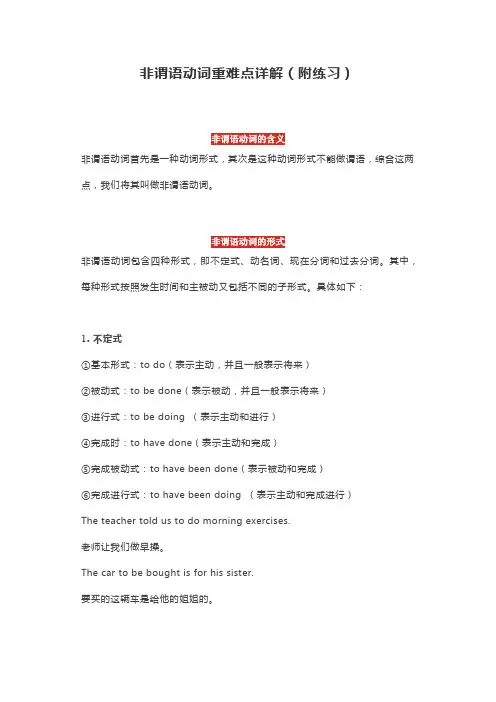
非谓语动词重难点详解(附练习)非谓语动词首先是一种动词形式,其次是这种动词形式不能做谓语,综合这两点,我们将其叫做非谓语动词。
非谓语动词包含四种形式,即不定式、动名词、现在分词和过去分词。
其中,每种形式按照发生时间和主被动又包括不同的子形式。
具体如下:1. 不定式①基本形式:to do(表示主动,并且一般表示将来)②被动式:to be done(表示被动,并且一般表示将来)③进行式:to be doing (表示主动和进行)④完成时:to have done(表示主动和完成)⑤完成被动式:to have been done(表示被动和完成)⑥完成进行式:to have been doing (表示主动和完成进行)The teacher told us to do morning exercises.老师让我们做早操。
The car to be bought is for his sister.要买的这辆车是给他的姐姐的。
She pretended to be reading when the teacher came into the classroom.老师进来时,她假装正在读书。
The thief is said to have escaped.据说小偷已经逃跑了。
The thief is said to have been arrested.据说小偷已经被抓住了。
She is said to have been working in the factory over the last 20 years.据说在过去的20年里,她一直在这家工厂工作。
2. 动名词①基本形式:doing (表示主动)②被动式:being done(表示被动)③完成式:having done(表示主动和完成)④完成被动式:having been done(表示被动和完成)Travelling in space by ordinary people will be common in the future.在未来,普通人在太空旅行将会是普遍的事情。
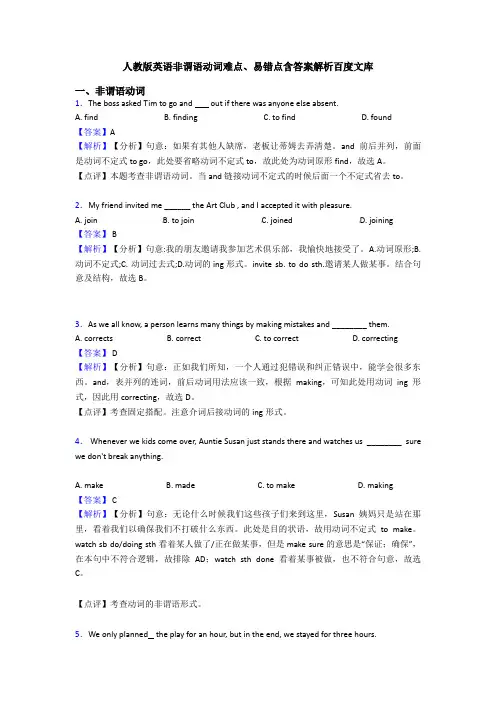
人教版英语非谓语动词难点、易错点含答案解析百度文库一、非谓语动词1.The boss asked Tim to go and out if there was anyone else absent.A. findB. findingC. to findD. found【答案】A【解析】【分析】句意:如果有其他人缺席,老板让蒂姆去弄清楚。
and前后并列,前面是动词不定式to go,此处要省略动词不定式to,故此处为动词原形find,故选A。
【点评】本题考查非谓语动词。
当and链接动词不定式的时候后面一个不定式省去to。
2.My friend invited me ______ the Art Club , and I accepted it with pleasure.A. joinB. to joinC. joinedD. joining【答案】 B【解析】【分析】句意:我的朋友邀请我参加艺术俱乐部,我愉快地接受了。
A.动词原形;B.动词不定式;C. 动词过去式;D.动词的ing形式。
invite sb. to do sth.邀请某人做某事。
结合句意及结构,故选B。
3.As we all know, a person learns many things by making mistakes and ________ them.A. correctsB. correctC. to correctD. correcting【答案】 D【解析】【分析】句意:正如我们所知,一个人通过犯错误和纠正错误中,能学会很多东西。
and,表并列的连词,前后动词用法应该一致,根据making,可知此处用动词ing形式,因此用correcting,故选D。
【点评】考查固定搭配。
注意介词后接动词的ing形式。
4. Whenever we kids come over, Auntie Susan just stands there and watches us ________ sure we don't break anything.A. makeB. madeC. to makeD. making【答案】 C【解析】【分析】句意:无论什么时候我们这些孩子们来到这里,Susan姨妈只是站在那里,看着我们以确保我们不打破什么东西。
英语非谓语重难点考点总结一、非谓语动词的概念非谓语动词是指在句子中不是谓语的动词,主要包括不定式、动名词和分词(包括现在分词和过去分词)三种形式。
非谓语动词在句子中可以充当除了谓语以外的各种成分,如主语、宾语、定语、状语等。
二、非谓语动词的特点1. 非谓语动词没有人称和数的变化,不受主语的限制。
2. 非谓语动词可以有自己的宾语、状语等,构成非谓语动词短语。
3. 非谓语动词不能独立作谓语,只能与助动词等一起构成谓语。
三、非谓语动词的用法1. 不定式不定式的基本形式是“to + 动词原形”,有时可以省略to。
不定式可以表示将来、目的、结果等意义,常与名词、形容词、副词等连用,如:want to do、be happy to do等。
2. 动名词动名词的基本形式是“动词+ -ing”,表示正在进行的动作或状态。
动名词可以作主语、宾语等,如:Reading books is my favorite hobby.(主语)I enjoy reading books.(宾语)3. 分词分词分为现在分词和过去分词两种形式。
现在分词的基本形式是“动词+ -ing”,表示正在进行的动作或状态;过去分词的基本形式是“动词+ -ed”,表示已经完成的状态或动作。
分词可以作定语、状语等,如:the exciting match(定语)、the match finished at 8:00(状语)。
四、非谓语动词的难点考点1. 非谓语动词作主语的判断非谓语动词作主语时,主要判断该句子缺什么成分,如果缺主语,就可以考虑使用动名词或不定式。
例如:____(see)is believing. 这句话缺少主语,可以使用动名词或不定式,但根据句意“眼见为实”,应该使用动名词。
2. 非谓语动词作宾语的判断非谓语动词作宾语时,主要判断该动作与句子主语的关系。
如果该动作是句子主语的主动行为,则使用不定式;如果该动作是句子主语的被动行为,则使用动名词。
非谓语动词难点、易错点含答案解析一、非谓语动词1. Though he often made his little sister ______, today he was made ______ by his little sister. A. cry; to cry B. crying; crying C. cry; cry D. to cry; cry【答案】 A【解析】【分析】句意:虽然他经常使他的妹妹哭,但是今天他妹妹使他哭了。
使某人做某事: make sb do sth.后跟省to的不定式作宾语补足语,即前句填:cry,主动语态中省to的不定式,变为被动语态时,要用带to的不定式. 即后句填:to cry. 故选A。
2.Our teacher often advises us the habit of making notes while reading.A. to developB. developC. to developingD. developing【答案】 A【解析】【分析】考查非谓语动词。
句意:我们的老师经常建议我们培养在阅读时做笔记的习惯。
Advise sbto do sth建议某人做某事,所以选A。
3.For more than once, our head teacher asks us ___________ the habit of keeping a diary.A. developB. developsC. developingD. to develop【答案】D【解析】【分析】句意:不止一次,我们的班主任叫我们养成记日记的习惯。
ask sb to do sth叫某人做某事。
故答案为D。
【点评】考查非谓语动词,牢记固定搭配。
4.As a volunteer,the girl wants to visit sick kids in the hospital them up.()A. to cheerB. cheerC. cheeringD. cheered【答案】 A【解析】【分析】作为一名志愿者,这个女孩想去看望医院里生病的孩子使他们振作起来.根据句意可知这个女孩想去看望医院里生病的孩子的目的是使他们振作起来,故该空处填入动词不定式作目的状语,故填to cheer,故选A5. You should ask Bob ________ his own clothes. He is ten years old now.A. washB. washesC. washingD. to wash【答案】 D【解析】【分析】考查非谓语动词。
【英语】非谓语动词解说及练习(含答案)一、单项选择非谓语动词1.The film star wears sunglasses. Therefore, he can go shopping without ___________. A.recognizing B.being recognizedC. having recognized D. having been recognized【答案】 B【分析】试题剖析:本题考察动词的非谓语动词形式。
句意:那位电影明星戴上墨镜。
所以,他去买东西不会被认出来。
依据题中的介词without判断,今后应当使用动词的动名词形式,因为他是被人认出的,所以应当用动名词的被动式,所以选B。
考点:考察非谓语动词的用法2.(天津 ) The hospital has recently obtained new medical equipment, ________ more patients to be treated.A. being allowed B.allowingC. having allowed D. allowed【答案】 B【分析】【详解】考察非谓语动词。
句意:近期这个医院购进了新的医疗设施,同意更多的病人被治疗。
前句购进医疗设施和后边同意更多的病人被治疗之间是必定的结果关系,用doing 即此刻分词作结果状语,表示理所应当的结果。
A. being allowed 表示被动且正在进行; C. having allowed 重申先于谓语动词发生; D. allowed 表示被动且达成,应选B。
【点睛】判断非谓语动词的形式的第一步是剖析句子成分,看是用谓语动词仍是非谓语动词,确立了是非谓语动词,还要判断非谓语动词的成分,和这个动词和逻辑主语的关系。
3.________ by the advances in technology, many farmers have set up wind farms on their land. A. Being encouraged B.EncouragingC. Encouraged D. Having encouraged【答案】 C【分析】试题剖析:考察过去分词做状语:句意:被科技的进步激励着,好多农民在自己的土地上建起了风力发电厂。
英语非谓语动词及其解题技巧及练习题(含答案)含解析一、非谓语动词1.Nowadays,most people prefer to________ computer games rather than ___________ books.A. play;readingB. play;readC. playing; reading【答案】 B【解析】【分析】句意:现在,大部分人比起读书更喜欢玩电脑游戏。
prefer to doA rather than do B比起B更喜欢做A。
故答案为B。
【点评】考查动词prefer的用法,掌握固定搭配。
2.When you leave, please turn off the lights energy.A. saveB. to saveC. savingD. saved【答案】 B【解析】【分析】句意:当你离开时请关灯以节约能源。
动词不定式表示目的,结合句意,故选B。
3.To live a low-carbon life, we must remember ________ the lights when we leave the room. A. to turn off B. turning off C. not to turn off【答案】 A【解析】【分析】句意:要过低碳生活,我们必须记住离开房间时要关掉灯。
remember (not)to do sth.忘记要做的事;remember doing sth.忘记已经做过的事。
根据句末whenwe leave the room.可知关灯的动作还没有做,此处表示肯定含义,要用不定式的肯定式,故选A。
【点评】考查动词remember的固定搭配。
根据所表示的含义选择正确的搭配。
4.—In my opinion, animals shouldn't be kept for fun.— I think so. Forests are the best places for animals ______________.A. liveB. livingC. to liveD. to live in【答案】 D【解析】【分析】句意:——在我看来,动物不应该被用来取乐。
(英语)高中英语非谓语动词技巧小结及练习题含解析一、单项选择非谓语动词1.When we saw the road ________ with snow, we decided to spend the holiday at home. A.block B.to blockC.blocking D.blocked【答案】D【解析】【详解】考查非谓语动词。
句意:当我们看到路上被雪覆盖时,我们决定在家里度假。
此处用非谓语动词作宾补,动词block与see的宾语the road之间为被动关系,构成短语see sb/ sth done。
故选D。
2.On the third floor there are two rooms, ________ used as a meeting-room.A.the larger of which B.one of themC.and a larger of them D.the largest one of which【答案】B【解析】考查过去分词的独立主格结构。
句意:三楼有两个房间,其中一个被用作会议室。
如果选A项,是非限制性定语从句,从句应该用一般过去时态的被动语态,此处used是过去分词,所以A错;如果选C项,中间加and表明是并列句,the+比较级,才表示“两个当中更大的”,故C项错;因为是两个房间,不可能出现最高级,故D项错;只有选B项是过去分词的独立主格结构,符合题意。
【名师点睛】非谓语动词的独立主格结构一、独立主格结构的概念独立主格结构(Absolute Structure)是由名词或代词加上分词等构成的一种独立结构,用于修饰整个句子。
独立主格结构中的名词或代词与其后的分词等构成逻辑上的主谓关系。
这种结构与主句不发生句法上的联系,它的位置相当灵活,可置于主句前、主句末或主句中,常由逗号将其与主句分开。
需特别注意的是,独立主格结构与主句之间不能使用任何连接词。
非谓语动词知识要点概括以及难点和考点分析1.“非谓语动词”这个名称是什么意思在做非谓语动词题目之前,首先要搞清楚这个名称的意义;在英语中,很多语法名称在我们中国人的母语中是不存在的,所以,只有我们了解了这个语法的本质,或者说英语中使用这个语法的目的,才能更好的理解和运用这个语法知识;首先,英语句子从结构上说,大致和中文相差不多,基本上都是“主谓宾”这个顺序,但英语句子和中文句子最大的不同点在于,英语句子里只能有一个谓语动词,而且逗号不能作为分割句子的连词使用;比如这句话:他生病了,他不能来了;在中文中,这句话没有问题,但如果翻译成英语:He is ill, he is not coming.就错了,因为逗号后面没有连词,这句话里出现了两个谓语动词“is”,产生了冲突;如果要修改的话,可以加上连词so,也可以把逗号变成分号分号等于连词,后面he的首字母还是要小写,也可以索性把逗号变成句号,变成两句话;当然,如果用英语中所特有的技巧来处理的话,可以使用从句,可以改为Because he is ill, he is not coming. 这样操作的话,就等于把一个谓语动词放入了从句中,它就不和主句里的另一个谓语动词形成冲突了;其实这也是“从句”------这个英语中所特有的语法现象存在的道理;这句话最后一种修改方法就是使用非谓语动词,可以改为“Being ill, he is not coming.”; 所以各位现在就明白了,非谓语动词这个语法现象存在的意义就是为了使一句英语句子保持只有一个谓语动词;非谓语动词如果能灵活运用,在有些情况下能代替从句非谓语动词做状语和定语时候,可以代替原来的状语从句和定语从句,可以让句子更加精简;2.非谓语动词的形式非谓语动词主要可以分为三种形式:1. 分词 2. 动词不定式 3. 动名词;其中,分词又可以分为现在分词和过去分词;它们的具体形式如下:现在分词:being, doing, having done现在分词表示主动过去分词: done, being done , having been done 过去分词表示被动不定式: to do 表示主动, to be done 表示被动;某些题目中还会出现to have done/to have been done和to be doing等特殊形式,下面重点解析里会谈到;动名词:doing表示主动, being done表示被动某些情况下having done和having been done也可以做动名词,下面重点解析里也会谈到;本质上说,非谓语动词是谓语动词变过来的,具体变化形式如下:3.非谓语动词在句子里的成分前面说了,英语句子的结构和成分在很多情况下都很接近中文,所以,英语句子中使用到频率比较高的成分也就这六种“定语,状语,补语,主语,宾语,表语,谓语,同位语”;下面我们来看一下非谓语动词里的分词和不定式主要用于句子的什么成分;首先,请大家试做三道题:I am sitting on a chair _________make of wood.________ hear the news, he cried.The food is good _______taste.应该不难吧第一题答案填made,第二题填Hearing,第三题填to taste;通过这三句例句,我们能看出,分词和不定式在句子中主要充当的定语、状语、补语成分;注意,分词也可以作表语,比如I am swimming./My car is stolen. 但此类句子属于大家初中里就学过的简单句型,不属于有非谓语动词的复杂句型,所以这里不再总结我们其次再来看动名词;动名词其实意义就是名词,所以,动名词在句子中充当的成分一般都是主语、表语、宾语有些情况下,不定式也可以担当主语、宾语、表语;比如:Swimming is my hobby.To become a pilot is my dream.My hobby is swimming.I like swimming.有关非谓语动词的重点解析:1)首先,非谓语的动词变化,和谓语动词是现在时还是过去时无关;所以,如果谓语动词是did,was/were doing, would do和had done,非谓语动词形式还是doing,to do以及having done;其次,如果非谓语动词加上否定式,not一定要放在最前面,分别应该是not doing,not to do以及not having done;特别是最后一个having done的否定,不要和谓语动词have not done的否定式中not的位置混淆;2)对于动词不定式to do以及to be done,各位一定要记住它们容易出现的题型,以免和doing以及done的用法混淆起来;一般使用动词不定式的常见题型有以下几种,一种是表示将来或者表示目的,比如,I am here to see you. 这里的to see you就是动词不定式表示目的;还有一种是动词不定式做主、宾、表类似于动名词,比如To become a doctor is my dream.当然,这里用动名词也未尝不可,这里用动词不定式更强调是将来的理想;还有一种是做形式主语或者形式宾语,比如,Science has made it possible for us to live better./It is important to study hard.这里一般只用动词不定式,不用动名词,除了某些特别句型,比如It is no use doing sth./It’s worthwhile doing this job.;最后一种是在某些固定搭配中,比如,He is the first man to come./We have five minutes to go./There is a lot of work to do. 这里不能换为动名词,这种搭配只有靠大家去积累;在某些句型中,动词不定式结构还会出现完成时的变化,遇到这种情况也要注意;一般此类题型出现在这两种句型里,一种是besaid/reported等to,比如He is said to have been killed yesterday. 这里使用动词不定式完成时的原因是因为在据说这件事的时候他早已经在昨天就被杀了,所以谓语动词“is”和非谓语动词“kill”存在着一个明显的时间先后,所以要用完成时;还有一种常见题型是这样的,往往是这样一类表示打算的动词mean/intend/be/plan to do比如He meant to have come yesterday, but he didn’t come because he was busy. 在这个题型中,使用动词不定式的意义是指过去的打算,但因为种种原因而没有实现,也就是说这个打算仅仅是停留在“过去的过去”;这里的时态也可以换为过去完成时”had meant to”,两种时态是等效的;3)对于having done以及having been done这个形式,各位也要去记住它们的常见题型;一般有三种,第一种是做时间状语表示明显的时间先后;注意“明显”两个字,在有些情况下,虽然有时间先后,但不明显的话,就不用这个结构;比如:Hearing the news, I cried.虽然这句话看上去有时间先后,但因为不明显,所以还是用hearing做时间状语;而在这句话中:Having done the job, I had a rest. 可以看出完成工作和休息是明显的前后两个动作,所以必须使用;第二种用法,having done或者having been done可以在某些个别的词组中代替动名词regret/remember/forget/admit等,比如forget doing sth.可以代替为forget having done sth. 请各位记住,也只有在这类动词里having done能做动名词了,并不是有“ing”的非谓语动词结构都是动名词,后面会再解释;第三种用法,出现在某些独立主格的结构中,比如The flight having been cancelled, we are disappointed. 除了以上三种常见题型,其他的场合,比如非谓语做定语做补语,having done几乎不会出现,一般都是主动的用doing,被动的用done,切记4)对于过去分词里的done和being done,这是一个不易搞清的难点,很多同学在做题时搞不懂这两个形式怎么使用;请大家记住一点,一般情况下,done使用的概率远远高于being done甚至可以这么说,以done作为答案的非谓语动词题占据了相当的比例,因为使用being done的时候,一定要表示被动的进行时时态的分词形式往往作为句子里的后置定语成分修饰名词,如果没有进行时,那就不能用它;比如The song ________sing now is a folk song. 这句话中,正是因为有了now这个时间状语,同时根据句子意思这里需要被动,所以答案是being sung;第二个使用的场合是作为被动的动名词形式;比如这道题,__________force to do the job makes me unhappy. 在这道题中,空格部分是句子的主语,主语需要动名词担当,而且根据意思这里是被动,所以答案是Being forced. 同时请大家比较这道题,___________force to do the job, I am unhappy. 虽然和前面那道题意思差不多,但答案却是Forced;原因就是这里的空格成分不是主语,而是原因状语,所以就用分词形式forced因为也没有进行时或者表示时间先后的概念,所以不用being forced或者having been forced;因此请各位记住了,当你看到一道题里有being forced这个选项的时候,一定要先问自己,这里的being done能不能作为表示进行时态的过去分词,或者能不能做被动的动名词结构,如果无法担当以上两个功能中的其中一种,那么就不能选它;5)最后再提一下动名词里某个易混淆的细节问题;前面说了,动名词的结构只有两种,主动的是doing,被动的是being done;在某些动词词组后面having done和having been done才能作为动名词代替doing和done;比如forget doing/remember doing,这类词组中,可以把doing换成having done;但请记住,不是任何的动名词doing都能换为having done;又比如这道题:After________ finish the job, I walked out. 这道题只能填finishing,因为after是介词,所以后面用动名词doing,如果要填having finished,那么前面就不能有After了;4.非谓语动词的解题思路拿到一道非谓语动词题,究竟怎样的解题思路是正确的能够达到最高的命中率很多同学在解非谓语动词题时候,只知其一不知其二,也许这样可以做对一部分题目,但题目稍稍变一下他就迷糊了,就容易出错了;所以关键我们还是要掌握很多本质的解题道理;我把非谓语动词的解题思路概括为以下几个步骤;1.首先要看清楚,这道题在这里需要用非谓语动词,如果这个大方向错了,那么后面就不用做了;比如这道题,He entered the room, _______take out a book and began to read.这道题中,take就不需要用非谓语动词taking,因为后面的连词and能把这三个动词都连起来,所以填took就可以了;2.确定完这道题需要使用非谓语动词之后,第二步是需要去决定这个非谓语动词到底是主动的形式还是被动的形式;这一步可以说是解非谓语动词题的重中之重很多同学非谓语动词题做错,就摔在这一步上;那么如何去判断这个非谓语动词究竟应该变为主动还是被动形式呢有些同学喜欢通过句子意思来判断,这当然可以,但在某些比较难的句子中,你就很难把它们翻译过来判断了;所以,我总结了三句话,帮助大家来判断;(1)如果这个需要变化的动词是及物动词或者是及物词组,在句子中,它后面跟了宾语,那么这个动词或词组就变成主动的非谓语动词形式;(2)如果这个需要变化的动词是及物动词或者是及物词组,在句子中,它后面没有跟宾语,那么这个动词或词组就变成被动的非谓语动词形式;(3)如果这个需要变化的动词是不及物动词,在句子中,它后面没有跟宾语,那么这个动词就变为主动的非谓语动词形式;通过上面三句话我们可以看出,非谓语动词应该是变为主动形式还是被动形式,关键在于观察这个动词是不是及物动词,后面有没有宾语,而不是去看这句话里的对象究竟是sb.还是sth.3.决定了主动还是被动之后也就是上面第二页中我总结那张表格,应该是选左边一栏还是右边一栏,然后再根据它在句子中充当的成分,具体决定选哪个形式;按照我这样的思路解题,非谓语动词题是相当简单的,解题快捷迅速,而且不容易受到干扰元素的干扰;比如这道例题___________see from the top of the mountain, the village is very small. 有部分老师在讲解这道题的时候,会和学生说因为后面的village不长眼睛的,不可能主动去看,而是被看到的,所以前面答案填Seen;这样的解释不能说错,但只是触及了表面,学生并不能真正掌握解题技巧;其实真正解题办法很简单,就是观察see这个动词,按照我的解题思路,首先这里需要非谓语动词因为后面逗号这里没有连词,句子的谓语动词是is,其次,see作为及物动词,现在没有宾语,于是参见我前面概括的第二句话,see就变成被动的非谓语动词结构,同时分析句子结构,这里需要一个状语,这个状语也没有分别“表示将来或目的、表示进行时态、表示明显的时间先后”,所以也不可能分别用“to be seen, being seen, having been seen”,答案就是seen;很方便吧如果按照前面老师的解题思路,我这道题稍稍改动一下,_______see from the top of the mountain, the people below are very vague. 这时某些死读书的学生就会搞不清了,后面主语是people,people也可以主动发出看这个动作啊;其实这道题答案还是Seen,所以我们就看出,非谓语动词怎么变,其实和句子里的对象是无关的再比如大家学过的词组,have sb. do sth./have sth. done 很多老师只让学生去死背这两个词组,其实这两个词组中,到底用do还是done,和前面是sb.还是sth.没关系的,关键还是看后面那个动词是不是及物,有没有宾语;比如这句话,The teacher wants to have the monitor ______bring here. “monitor”可以解释为班长或者电脑显示器,和后面那个bring的变化形式无关,根据解题思路,bring是及物动词,后面没有宾语,所以要变成brought;最后,我们用以上的解题方法来分析一下高考中的一道非谓语动词题;Ideally ______for Broadway theatres and Firth Avenue, the New York Park hotel is a favourite with many guests.A. locatingB. being locatedC. having been locatedD. located观察这个动词locate,它是及物动词因为我们熟悉的句型是sth. be located….既然有被动,那肯定是及物动词,现在后面没有宾语,那就变成被动,同时这里的非谓语动词是做原因状语成分,不需要考虑B和C选项里的进行时态或者是明显的时间先后,所以答案选D;。
英语:动词的非谓语形式【重点难点提示】一、重点是:1 .动词不定式(1)动词不定式的构成为:“to + 动词原形”(有时可不带to)。
动词不定式没有人称和数和的变化。
(2)动词不定式既有名词的特性,又有动词的特性,它可以有自己的宾语和状语。
它在句中可充当主语、宾语、表语、定语、状语和补足语。
2 .动词ing形式的用法。
3 .动词过去分词的用法。
二、难点是:(1)在有些动词后动词不定式作宾语补足语时不带to。
(2)有些动词后只能接动词不定式作宾语。
(3)有些动词后只能接动词ing形式(即动名词)作宾语。
(4)有些动词后既可接动词不定式作宾语,也可接动词ing形式作宾语,但意思不同。
【同步达纲练习】Ⅰ .用括号中所给动词的适当形式填空。
1 .Bill lives in a place called (call) Gum Tree .2 .Let him have (have) a good rest .3 .Li Ping made the baby laugh (laugh) at last .4 .Miss Gao wants to take (take) these books to the classroom now .5 .She is ill .So she had better stay (stay) in bed for a few days .6 .You’d better not look (not ,look) out of the window in class .7 .It was very nice to play (play) with you .8 .They wake up their parents , called (call) :“Merry Christmas !”9 .A lot of good land has gone with them , (leave) only sand .10 .There was a fire (burn) in the fireplace .11 .The policeman told the boys (not ,play) football near the road .12 .Why not (go) to the park with us tomorrow ?13 .We’re free now .How about (fly) kites ?14 .We often hear our English teacher (sing) English songs .15 .One day ,his father saw him (sit) on some eggs .16 .Mr Wu have watched us (play) basketball for half an hour .17 .This morning I kept on (think) about the Christmas party this evening .18 .A lot of English people are good at (boat) .19 .We’re very thirsty .Let’s stop (drink) some water .20 .When the two boys saw the teacher ,they stopped (fight) at once .21 .Kate is a little ill .She doesn’t feel like (eat) anything these days .22 .In the old days ,the workers were made (work) more than 16 hours a day .23 .Have you finished (do) your homework yet ?24 .The heavy snow stopped many people from (go) to work .25 .Mary found a watch (lie) on the road on her way to school .26 .Do you like (fish) ?Yes .But I don’t like (fish) now .27 .Thank you for (lend) it to me .28 .Jim and his parents enjoy (live) in China very much .29 .—Do you mind my (smoke) here ?—Yes ,but I do .30 .—Would you like (come) to my birthday party this evening ?—Certainly .I’ll be glad to .31 .Don’t spend too much time (watch) TV .32 .The farmers are busy (get) ready for the next year .33 .We’re going to do some (shop) this Sunday .34 .—Shall we go (skate) tomorrow ?—That’s a good idea .35 .In England ,the first name is the (give) name .36 .Do you know another way of (say) the word ?37 . (take) a walk after supper is good for our health .38 .He quickly got up and went on (run) .39 .Sorry ,I have a lot of work (do) today .40 .It’s very kind of you (help) us .41 .It’s much better (give) than (receive) .42 .I don’t know what (do) next .43 .She’ll read a book tonight instead of (see) a film .44 .England is a (develop) country and India is a (develop) one .45 .That pot was used for (keep) tea hot after it was made .46 .I remember (tell) you the story before .47 .Take the second (turn) on the right .48 .The boy can’t get (dress) himself .49 .Don’t forget (lock) the door when you leave .50 .She’ll try her best (catch) up with the class .参考答案【同步达纲练习】Ⅰ .1 .called 2 .have 3 .laugh 4 .to take 5 .stay 6 .not look 7 .to play 8 .calling 9 .leaving 10 .burning 11 .not to play 12 .go 13 .flying 14 .sing 15 .sitting 16 .play 17 .thinking 18 .boating 19 .to drink 20 .fighting 21 .eating 22 .to work 23 .doing 24 .going 25 .lying26 .fishing ,to fish 27 .lending 28 .living 29 .smoking 30 .to come 31 .watching 32 .getting 33 .skating 34 . skating 35 .given 36 .saying 37 .Taking 38 .running 39 .to do 40 .to help 41 .to give ,to receive 42 .todo 43 .seeing 44 .developed ,developing 45 .keeping 46 .telling 47 .turning 48 .dressed 49 .to lock 50 .to catch非谓语动词专项练习题一、用所给动词适当形式填空:A . ① I want one magazine ______ . ( read )② My teacher wanted me ______ this question . ( answer )③ The woman wanted her husband ______ at once . ( examine )④ My bicycle wants _______ . ( repair )B . ① What made you ______ so ? ( think )② The girl was made _____ a man she didn`t love at all . ( marry )③ The show made me _______ in the study of science . ( interest )④ He raised the picture to make everyone _______ clearly . ( see )⑤ He raised his voice to make himself _______ . ( hear )⑥ My father himself made some candles _______ light . ( give )⑦ The boss made the workers _______ day and night . ( work )C . ① You`d better get your own room _______ . ( clean )② Yesterday he got his wallet _______ . ( steal )③ You should get your friends _______ you . ( help )④ The lecture got us _______ . ( think )⑤ Don`t get ________ in the rain . ( catch )D . ① Did you see somebody _______ into the room ? ( steal )② I saw him _______ in the room at that time . ( read )③ She was glad to see her child ________ good care of . ( take )④ I saw her _______ at the windows , thinking . ( seat )⑤ She was seen ________ here . ( come )E . ① I like _______ very much . ( swim )② I don`t like _______ TV at this time . ( watch )③ He never likes _______ at the meeting . ( praise )④ I feel like _______ to the cinema . ( go )⑤ Would you like ______ with me ? ( go )F . ① The man ______ at the meeting now is from the south . ( speak )② I don`t know the professor ______ at the meeting tomorrow . ( speak )③ He is the professor _______ to dinner . ( invite )G . ① It was so cold and he had the fire _______ all night long . ( burn )② I have a lot of exercises ________ today . ( do )③ "Do you have nay clothes _______ today ? "asked Mother . ( wash )④ You`d better have that bad tooth _______ out . ( pull )⑤ I want to have him _______ a car for me . ( find )H . ① He doesn`t do anything but _______ all day . ( play )② We have no choice but _______ . ( obey )③ I`m thinking of how _______ my English . ( improve )④ He made an apology for _____ late . ( be )I . ① He told us about his trip in an _______ voice . ( excite )② He told us his story in a _______ voice . ( tremble )③ At the sight of a snake , the little girl was very _______ . ( frighten )④ The boy was _______ , so I didn`t believe him again . ( disappoint )J . ① He is looking forward to ______ college . ( enter )② He is looking forward to _____ nothing . ( see )K . ① When he heard the news , he couldn`t help ________ with joy . (jump)② I couldn`t help ______ by the beauty of nature . ( strike )③ Sorry , I can`t help ______ the housework today . ( do )L . ①______ enough time , we`ll do it better . ( give )②______ a candle , he went on reading . ( light )③______ from the hill , the park looks more beautiful . ( see )④______ the people well , we must work hard at our lessons . ( serve )二、单项选择:(1)1. Saying always has less difficulty than _____.A. doneB. doingC. to doD. having done2. The girl is seriously ill. There is _____.A. nothing to do but send for a doctorB. something to do but to send for a doctorC. nothing to do but to send for a doctorD. anything to do but sending for a doctor3. The rest of the money _____ to Alice.A. is to sendB. are to sendC. is to be sentD. are to be sent4. Although swimming is his favorite sport, yet he doesn’t like _____ today.A. to swimB. swimmingC. swimD. to have swim5. She said she was sorry _____ the train, so she had to stay here for another day.A. missingB. having missedC. to missD. to have missed6. _____ the same mistake again made his parents very angry.A. His being madeB. He has madeC. He had makingD. His making7. I find the man hard _____.A. to be pleasedB. pleasingC. pleasedD. to please8. You’d better not have the lights _____ all day long.A. burningB. burnedC. to burnD. being burnt9. It is _____ thinking about it now.A. of no useB. not useC. no useD. not of any uses10. —Would you like to sing a song for us?—_____.A. I prefer notB. I prefer not toC. I prefer to notD. I wouldn’t prefer11. He insisted _____ the working site.A. to be sent toB. being sent toC. on being sent toD. that to be sent to12. During the next ten years, she had to work hard _____ for the necklace.A. payingB. to payC. for payingD. in order to paying13. Janet was angry at _____.A. my not waiting for herB. I didn’t wait for herC. me not wait for herD. me to not wait for her14. I prefer staying at home _____ the theater.A. to go toB. for going toC. to going toD. rather than go15. Please get someone _____ the washing machine. I want to get it _____ as soon as possible.A. to repair/to be repairedB. repair/repairedC. to repair/repairingD. to repair/repaired16. _____ more time, he could have done the work much better.A. To be givenB. To giveC. GivenD. Giving17. The information _____ to us is of great value.A. broughtB. takenC. being takenD. being carried18. The building _____ next month will be a modern hospital.A. builtB. being builtC. to be builtD. be built19. Jessie was sick _____ such noise.A. of hearingB. to hearC. of being heardD. heard20. _____, he left the room.A. Finishing the workB. Had finished the workC. After finished the workD. Having finished the work21. _____ afraid _____ behind, Bill studied even harder than ever before.A. To be/of fallingB. Being/fallC. Being/of fallingD. To be/to fall22. The machine requires _____, so the workers are required _____ ready.A. repair/to getB. repairing/to getC. repairing/gettingD. to be repaired/getting23. Everyone dislikes _____.A. being laughedB. to be laughedC. being laughed atD. to be laughed at24. Would you like Helen _____ you since you have some difficulty?A. helpingB. to helpC. has helpedD. help25. He is beginning _____ his mistakes.A. correctB. to correctC. correctingD. corrected26. The Americans can’t use chopsticks _____.A. to eatB. to eatingC. eatingD. to eat with27. My wish is _____ the people well in the future.A. to serve forB. to serveC. servingD. serving for28. The poor boy, _____ with extraordinary strength, _____ from the ground.A. filled/roseB. filling/roseC. full/raisedD. filled/risen29. Most shops are open every day, Sunday _____.A. includingB. includedC. being includedD. to include30. _____ hot, he left only his stomach _____ with a piece of cloth.A. Feeling/coveringB. Feeling/coveredC. Felt/coveredD. Felt/covering31. He advised _____ a meeting _____ the problem.A. holding/to discussB. holding/for discussingC. to hold/to discussD. hold/discussing32. _____ the teacher, and he will tell you the answer.A. AskingB. AskC. If askD. If you ask33. The thief entered the room without _____.A. noticingB. being noticedC. having noticedD. having been noticed34. I happened _____ the story when she told me about it.A. having heard ofB. to have heard ofC. to be heard ofD. to hear of35. He is said _____ abroad already.A. having sentB. to be sendingC. to have been sentD. being sent36. He was made _____ working because of his poor health.A. stoppingB. to stopC. stoppedD. stop37. Do you consider it any good _____ again?A. to tryB. tryC. tryingD. for you to try38. I regret _____ you that we are unable to offer you a job.A. informingB. having informedC. to informD. to informing39. I would appreciate _____ back this afternoon.A. you to callB. you callC. your callingD. you’re calling40. She admitted _____ the key.A. being takingB. to takeC. having takenD. to have taken41. Besides _____, she is kind and tender.A. beautifulB. being beautifulC. she beautifulD. is beautiful42. I don’t want to speak to you, but I _____.A. have to speakB. have toC. must speakD. must43. I wondered whether the movie was _____ worth _____.A. very/seeingB. well/being seenC. very/being seenD. well/seeing44. The lecturer began by _____ us where the island was, and went on _____ about its history.A. telling/talkingB. to tell/to talkC. telling/to talkD. he told/talking45. After seeing the movie, _____.A. the book was read by himB. the book made him want to read itC. he wanted to read the bookD. the reading of the book interested him46. —Why doesn’t he take notes?—He has no pen _____. He seems _____ it.A. to write/to forget bringingB. to write with/to forget to bringC. to use with/to have forgotten to bringD. to write with/to have forgotten to bring47. When _____, water can be changed into vapor.A. heatedB. being heatedC. having been heatedD. to heat48. Having finished the work, _____.A. it was almost six o’clockB. a postman came and delivered the evening paper and some lettersC. supper had already been preparedD. we had a rest and then had supper49. _____, she felt quite shy at the party.A. As she a strangerB. Being a strangerC. According to a strangerD. She was a stranger50. Flank went to the swimming pool _____ swimming.A. to goB. goneC. goingD. go51. The _____ girl sat in the corner, crying.A. frightenB. frightenedC. frighteningD. fright52. On a _____ morning the little match girl was found _____ at the corner of the street.A. freezing/freezingB. freezing/frozenC. frozen/frozenD. frozen/freezing53. They found a _____ old man _____ on the ground when the door was broken open.A. dying/lyingB. dying/liedC. dead/liedD. dead/lain54. Be quick, or you’ll get _____ in the rain.A. to be caughtB. catchingC. to catchD. caught55. Who could have imagined such a sweet-tempered girl as Jane _____ such a thing!A. doingB. to doC. will doD. does56. He told me not to leave the pot _____.A. uncoveredB. to uncoverC. to be uncoveredD. uncovering57. The experience made him _____ the study of science.A. interest inB. to interest inC. interesting inD. interested in58. He managed to make himself _____ with his _____ English.A. understood/breakingB. understood/brokenC. understand/breakingD. understand/broken59. Did you hear the sound like that of a door _____?A. burstB. to burst inC. burst inD. to be burst in60. I was deep in thought, so I didn’t notice _____.A. him to come inB. him come inC. he come inD. him coming in61. Have you any objection to _____ there on foot?A. be goingB. goingC. goD. went62. The wallet was returned to him without anything _____.A. missedB. to be missedC. missingD. to miss63. The teacher was far from _____ with the result of the exam.A. satisfyB. satisfiedC. being satisfiedD. satisfying64. Hurry up! Mother is sure _____ us at home.A. waitingB. to wait forC. to be waitingD. to be waiting for65. Mr Brown is said _____ a new novel.A. to writingB. to have been writtenC. to be writtenD. to have written66. When _____ into a warm room, the ice soon changed to water.A. to takeB. to be takenC. takingD. taken67. The old man walked in the street _____.A. followed his sonB. and following his sonC. and followed by his sonD. followed by his son68. _____ with fear, a hungry fox hid himself in a small cave, _____ his tail to the rain.A. Trembling/exposingB. Trembled/exposedC. Trembled/exposingD. Trembling/exposed69. The two farmers _____ what appeared to be small guns forced the enemy officer to hand in his map.A. carriedB. were carryingC. carryingD. had carried70. Six _____ nine makes fifteen.A. added toB. adds toC. added up toD. added by71. The lecturer _____ will be here tomorrow.A. to talk about so muchB. to be talking about so muchC. so much talking aboutD. so much talked about72. _____ some of the questions _____, the Premier said goodbye to us.A. Left/unansweredB. Leaving/unansweredC. Leaving/unanswerD. Left/unanswer73. _____ her mother had come, her face lit up.A. HearingB. Having heardC. When heardD. When she heard74. _____ in white, she looks much more beautiful.A. WearingB. DressingC. DressedD. Having dressed75. _____, the boy couldn’t enter his house.A. Since the key had lostB. The key being lostC. Lost the keyD. Having lost the key76. The Arctic is considered _____ the northern part of the Atlantic.A. having beenB. to have beenC. to beD. being77. It is impossible for the work _____ within a month.A. finishingB. being finishingC. to finishD. to be finished78. I am too glad _____ you.A. to seeB. seeingC. sawD. at seeing79. There is _____ what the weather will be like.A. not knowingB. no knowingC. not knowD. no known80. The bottle _____ the poison was sent to the laboratory for a test.A. containingB. containedC. which containingD. which is contained81. _____ the children, we are all sure everything will be all right.A. With him taken care ofB. With he taken care ofC. With him taking care ofD. With he taking care of82. At first she wanted to go to the cinema, but on second thoughts she decided it would be better _____ at home and _____.A. stay/workB. to stay/to workC. stay/to workD. to stay/work83. He didn’t speak to me, let alone _____ me.A. helpB. to helpC. helpingD. helped84. The people’s government does its best to have the living standard of the people _____.A. risenB. raisedC. riseD. raise85. The little girl found her teddy bear _____ under the bed.A. hidingB. to hideC. hideD. hidden86. Mr Smith is _____ to our English evening.A. more pleased than to comeB. more pleased to come thanC. more than pleased to comeD. more pleasing than to come87. Once _____, a bad habit is rather difficult to get rid of.A. formedB. to be formedC. formingD. having formed88. You can have no idea what is _____ to do when you come to see the strange boss.A. orderingB. being orderedC. to orderD. to be ordered89. The noise of the door _____ the baby.A. closing wakenB. to close wokeC. closed wakeD. being closed woke90. Please leave a window _____, for it’s too hot.A. openB. openingC. to openD. opened91. _____ not knowing the answer to such an easy question!A. HopeB. DecideC. ImagineD. Think92. He asked to be kept _____ about developments.A. informingB. informedC. to informD. inform93. _____ everywhere, the wolves had nowhere _____ themselves.A. Hunting/to hideB. To hunt/to hideC. Hunted/hidingD. Hunted/to hide94. It _____ this way.A. used to doB. used to be doneC. is used to doingD. is using to do95. They have a lot of difficulty _____.A. in overcomingB. to overcome itC. to overcomeD. to be overcome96. Didn’t you forget us _____ together in the countryside?A. to workB. to workingC. workingD. worked97. You always hear about planes _____ because of technical faults.A. having been delayedB. being delayedC. having delayedD. delaying98. These are needed for _____ clothes, paper and other necessaries.A. the making ofB. making ofC. to makeD. makings99. Have the police caught _____ yet?A. the prisoner who escapesB. the escaping prisonerC. the escaped prisonerD. the prisoner have escaped100. Do you still remember _____ you when you stayed in hospital?A. my mother and me visitingB. my mother’s and my visitingC. my mother and me to visitD. my mother and me to have visited三、单项选择(2)1. There ______ no classes yesterday, we paid a visit to the Great Wall.A. wasB. beingC. wereD. had been2. The policeman rushed into the room only ______ an old lady lying on the ground.A. foundB. findC. findingD. to find3. The boy lay on the ground, his eyes ______ and his hands ______.A. closing; tremblingB. closed; tremblingC. closed; trembledD. closing; trembled4.______, the girls raced on to the second runners.A. Stick in handB. With a stick in her handC. Sticks in handD. Sticks in hands5. Each of them got up early ______ to catch the early bus.A. to hopeB. hopingC. so thatD. and6. How pleased the Emperor was ______ what the cheats said!A. hearingB. heardC. hearD. to hear7. We should prevent pollution ______ happily.A. from livingB. livingC. to livingD. to live8.I am busy now, so I can’t help ______ the machine.A. repairB. to have repairedC. repairingD. fixing9. Jane came very close ______ a gold medal for Britain in the Olympics.A. to winB. winningC. to winningD. to be won10. The boy seated himself in the corner with his back ______ to his father.A. turningB. to turnC. to be turnedD. turned11. ----By the way, when did you get your bedroom ______?----Last week.A. to paintB. paintedC. paintingD. to be painted12. He likes ______, but he doesn’t like ______ today because it is too cold.A. to swim; to swimB. swimming; swimmingC. to swim; swimmingD. swimming; to swim13. There is ______ what the weather will be like.A. not knowingB. no knowingC. not knowD. no known14. The novel is said ______ into many languages.A. to translateB. being translatedC. to have been translatedD. having been translated15. I’m examining the composition he has just finished ______ the possible mistakes in it.A. correctingB. to correctC. correctedD. correct16. They would not allow him ______ across the enemy line.A. to risk goingB. risking to goC. for risk to goD. risk going17. He spent as much time as he could _____ the child.A. teachingB. to teachC. teachD. for teaching18. ----Alice, why didn’t you come yesterday?----I ______, but I had an unexpected visitor.A. hadB. wouldC. was going toD. did19. How pleased the Emperor was ______ what the cheats said!A. hearingB. to hearC. heardD. hear20. ______ the room, a letter was laid on the ground.A. EnteringB. Having enteredC. He enteredD. Mrs Green entering21. They set out ______ for the ______ boy.A. searching; losingB. searching; lostC. to search; lostD. to search; missed22. ______ her mother had come, her face lit up.A. HearingB. Having heardC. When hearingD. When she heard23. They arrived at their university very late, ______ the gate closely shut.A. foundB. to findC. findD. finding24. ----Do you have anything more ______, sir?----No. You can have a rest or do something else.A. typingB. to be typedC. typedD. to type25. The manager promised to keep me ______ of how our business was going on.A. to be informedB. on informingC. informedD. informing26. With a lot of difficult problems ______, the manager felt worried all the time.A. to settleB. settlingC. settledD. being settled27. Will those ______ the children from abroad come to the headmaster’s office?A. teachingB. teachC. who teachesD. who teaching28. After ______ for the job, you will be required to take a language test.A. being interviewedB. interviewedC. interviewingD. having interviewed29. They apologized for ______ to attend the meeting.A. their not being ableB. their being not ableC. them not ableD. them being able not30. They would not allow him ______ across the enemy line.A. to risk goingB. risking to goC. for risk to goD. risk going31. ______ to nuclear radiation, even for a short time, may produce variants(变异体) of genes in human bodies.A. Being exposedB. Having exposedC. ExposedD. After being exposed32. China became the 143rd member of the World Trade Organization on December 11, 2001, thus ______ its 15-year wish to join the global trade body.A. having realizedB. realizedC. realizingD. to realize33. Tom looked at Jenny, tears ______ his eyes, and shouted out the words ______ in his heart for years.A. filling; having hiddenB. filled; hiddenC. filling; hiddenD. filled; hiding34. They apologized for ______ to attend the meeting.A. their not being ableB. their being not ableC. them not ableD. them being able not35. Which will you enjoy ______ your vacation, traveling abroad or working in the countryside?A. to spendB. spendC. spendingD. spent36. ----Will you please tell us how you can seize the robbers?----I will spend a whole week ______ in your room to wait for their coming.A. lockingB. to lockC. lockedD. being locked37. I regret ______ you that they are unable to come to your wedding tomorrow.A. informingB. having informedC. to have been informedD. to inform38. He wondered if he could slip out of the lecture hall without anyone ______.A. noticingB. noticedC. to noticeD. being noticed39. After ______ for the job, you will be required to take a language test.A. being interviewedB. interviewedC. interviewingD. having interviewed40. He spoke in such a high voice ______ out in the street.A. as to be heardB. to be heardC. as to hearD. to hear41. As early as 1647 Ohio made a decision that free, tax-supported schools must be set up in every town ______ 50 households or more.A. havingB. to haveC. to have hadD. having had42. The building project ______ next year is, I think, not easy ______ in time.A. being carried out; to completeB. carried out; to be completedC. to be carried out; to completeD. to be carried out; to be completed43. The reason ______ she gave for not coming to the party is that her mother wouldn’t allow her to.A. thatB. whatC. whyD. because44. Excuse me, could you tell me how to get to the Grand Hotel? I thought it was on this corner, but I seem to ______ a mistake.A. makeB. be makingC. having madeD. have made45. ----Here’s a new pair of shoes for you.----Thank you, but there’s no need ______ a new pair for me.A. to have boughtB. to buyC. buyingD. to be buying46. What worried the boy most was ______ to visit his father in the hospital.A. his not allowingB. his not being allowedC. having not been allowedD. his being not allowed47. To do a bit for the motherland, ______.A. working hard is necessaryB. to learn a foreign language is neededC. it is important to master scienceD. one should serve the people whole-heartedly48. Everything ______ into consideration, they ought to have another chance.A. to takeB. takenC. to be takenD. taking49. The officials discussed the plan that they would like to see ______ the next month.A. carry outB. carrying outC. to carry outD. carried out50. With a lot of difficult problems ______, the manager felt worried all the time.A. to settleB. settlingC. settledD. being settled51. ----Do you have anything more ______, sir?----No, you can have a rest or do something else.A. typingB. to be typedC. typedD. to type。